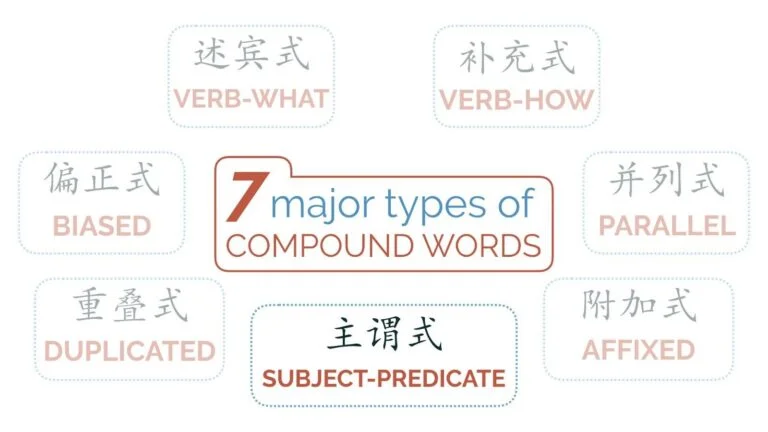A Sentence Within a Chinese Word

Word Structure: Subject-Predicate 主谓式
This is part 5 of an 8-part series exploring all 7 types of Chinese compound words. Part 5 is about a sentence within a Chinese word. Click below for the other parts:
Part 1 – Part 2 – Part 3 – Part 4 – Part 5 – Part 6 – Part 7 – Part 8
Subject-Predicate 主谓式

Subject-Predicate 主谓式 words are almost like a sentence in and of themselves. Take the example 地震 (dìzhèn “Earthquake”). The first morpheme is a noun and is like a Subject (地 dì “Ground”), and the second is the verb that happens to the Subject, which functions just like a predicate. In this case, 震 zhèn means “shake.” So what happened to the ground? The ground shook (earthquake). This is called a sentence within a Chinese word. 地怎么样呢? 地震了。
Nouns that make a sentence into a Chinese word
地震 dìzhèn
Earthquake
面包 miànbāo
Bread. (Noodle & Wrap- what happened to the noodles? They got bound up into bread. 面怎么样?面包了)
眼花 yǎnhuā
Have blurred vision (eye & blurred, what happened to the eyes? The eyes got blurred. 眼睛怎么样?眼睛花了)
耳鸣 ěrmíng
Have a ringing sensation in one’s ears (ear & ring, what happened to the ears? The ears are ringing. 耳朵怎么样?耳朵鸣了)
政变 zhèngbiàn
Government Coup (government & change, what happened to the government? The government changed. 政府怎么样?政府变了.)
日食 rìshí
Solar Eclipse (sun & eclipse, what happened to the sun? The sun got eclipsed. 太阳怎么样?日食了

Adjectives
口臭 kǒuchòu
bad breath (mouth & smell, what is happening to the mouth? It become smelly)
性急 xìngjí
Impatient; short-tempered (personality & anxious, what is happening to the personality? It become anxious)
光明 guāngmíng
Bright, promising (light & bright, what is happening to the light? The light is clear (and thus bright) )
火大 huǒdà
Very angry (temper & big, what is happening to the temper? The temper is big.)
自愿 zìyuàn
Voluntary (oneself & desire, what happened to oneself? Oneself desired to do something)
外来 wàilái
To come from outside (outside & come, what happened from the outside? Something came from the outside)
外在,内在 wàizài, nèizài
External & Internal- (outside/inside & located at) What happened to the Inside(outside)? It got located internally(externally).
内向,外向- nèixiàng, wàixiàng
Introverted & Extroverted- (inside/outside & siding with, what happened with the inside (outside)? It got sided with, or inclined towards, aka Introverted/Extroverted)
Verbs That Make a Sentence Into a Word
心疼 xīnténg
to love dearly, painfully (heart & painful, what did the heart do? It loved so much it hurt)
眼红 yǎnhóng
to covet, to envy (eyes & red, what did the eyes do? They turned red because of how jealous he was)
情愿 qíngyuàn
to desire (feelings & desire, what did the feelings do? They desired something)
日出 rìchū
Sunrise- (sun & appear, what did the sun do? The sun appeared)
目击 mùjī
to see with one’s own eyes (eye & come in contact with, what did the eyes do? They came in contact with an event)
自嘲 zìcháo
Make fun of oneself
自省 zìxǐng
Self-Reflect
自作 zìzuò
To Act for Oneself
自卫 zìwèi
to defend oneself
What did the self (自) do? It made fun of (嘲 cháo) itself, reflected (省 xǐng) itself, did (作 zuò) for itself, defended (卫 wèi) itself.
So these are all sentences within a Chinese word.








